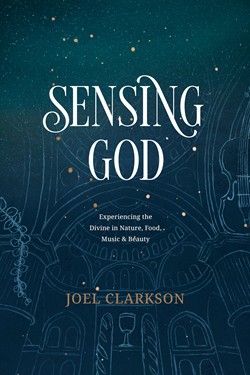Touch is the sacred bond that confirms, beyond any verbal expression or perceived action, that we are regarded by the other.
Excerpted from Sensing God by Joel Clarkson
There is something immediate, something startling in the effect of touch. Like the other senses, it brings us into contact with the world around us, makes us aware of the bounding lines of the space of our lives. And yet, even more, it does something which none of the other senses can do: It brings us into direct contact with each other. Touch is the sacred bond that confirms, beyond any verbal expression or perceived action, that we are regarded by the other. In touch, the participation in the other is unmediated; its expression is wordlessly given and received in a symbiotic immediacy that instills within each an instantaneous knowledge of the other and that we are equally known in that knowing. That act allows us a transformative experience of others which is unavailable by simply regarding them from a distance; and yet it equally reveals as much of ourselves as the person we apprehend through human contact. There is no question that this process can be frightening, and reasonably so. Touch is intensely powerful: Touch can lead to illness and injury and violence and even death; and yet equally in its purview are healing and consolation, affection and intimacy. To refrain from touch, to never be in contact with another, is to always be abstracted from them, set at a distance, and in turn, to always be distant from a certain knowledge of ourselves. No amount of thinking thoughts of another person, of seeing them and regarding them at a distance, can replace the knowledge that comes from contact alone. In touch is a sense of the fullness of self that is both given and received; the self can no longer be kept back when in contact with another. It must either surrender to the full givenness of whatever act of contact is initiated, whether for good or ill, or it must withdraw back into itself.

Touch is so intensely powerful that without human contact, the human body itself is adversely affected. In an infamously disastrous US study in 1944, infants were tested to discover if they could thrive on the necessities of health alone, without the additional benefit of human contact and engagement. Half of the test group were fed, bathed, and changed, so that their fundamental survival needs were met, but without the nurturing of human contact. Not only did the infants show a disparity from their fellow test group who did receive contact and emotional engagement but the lack of human interaction was so profoundly harmful that some of the infants tragically died, and the study had to be ended early.[i] The results were painfully obvious: Human contact is not simply a peripheral aspect of our existence but is rather a crucial, integral factor in our health and well-being.
Yet a cursory glance at contemporary culture shows how perilous touch has become. Surrounding us on all sides are the equally shocking perversions of touch, the way in which human contact becomes weaponized and used to harm others, whether intentionally or not. From the horrors of abuse committed by pastors and priests to the ruthlessness of chokeholds in law enforcement, from harrowing stories of assault in universities and workplaces (which are so often disregarded and ignored) to the oft-hidden and yet no less insidious physical violence inflicted by family members, the illness of corrupted human touch is everywhere around us. We’ve attempted, rightly and justly, to find a way to respond to these injustices and evils. We have set up commissions to investigate crimes and miscarriages of the law, designed initiatives to help give family members both the means and the bravery to speak up about abusers; we have only just begun to listen to the stories of both women and men who have quietly endured the pain of another’s mistreatment, and we have discussions about what consent looks like and how to listen more attentively to whether that expression is or isn’t being given. These things are good and necessary, and in many instances, express the power of the gospel at work, to “comfort the brokenhearted and to proclaim that captives will be released and prisoners will be freed.”[ii] There is much work to be done, and many of those who are willing to stand up to these dark happenings and speak light into them are living out noble vocations, often in service of the least of these.

And yet, the mere calling out of wickedness of the abuses of human touch in our society cannot in itself recover us to the fullness of a meaningful ethic of rightful human contact. We have begun the needed work of exposing the deeds of darkness and bringing them into the light, yet without an understanding of what it means to engage in human contact in a virtuous way, we will ever remain in uncertain waters, always at sea and never moored in the harbor of the hopeful and loving engagement with others which we so need. Wendell Berry eloquently gives voice to this crisis:
The public language can deal . . .with pornography, sexual hygiene, contraception, sexual harassment, rape, and so on. But it cannot talk about respect, responsibility, sexual discipline, fidelity, or the practice of love.[iii]
We are met with these two contradicting truths: that human contact is a profound need woven into the well-being of our bodies and that we cannot live healthily without it; and yet at the same time, the vast expanse of potential human contact is fraught with the most profound of dangers, pressing us back in fear. How can we even begin to think of touch as a good thing when there is so much ambiguity before us?
As always, the secret awaits us in the one who gave us our senses, and who, through His own life expressed the holy potency of touch as the gift of self.
[i] Rene A. Spitz, “Hospitalism: An Inquiry into the Genesis of Psychiatric Conditions in Early Childhood,” Psychoanalytic Study of the Child 1, no. 1 (1945):53–74.
[ii] Isaiah 61:1.
[iii] Wendell Berry, Sex, Economy, Freedom and Community: Eight Essays (New York: Pantheon Books, 1993), 122.
 Sensing God by Joel Clarkson
Sensing God by Joel Clarkson
Did God Give Us Our Senses So that We Could Enjoy Him More?
Sensing God is a discovery of Jesus in all of the sensory points embedded into each of us. It shows how the holiest acts in our daily lives are often the simplest: reveling in the beauty of nature; listening to our favorite music; eating a nourishing meal with family. These are potentially heartbeats of a living faith, and when we learn to recognize and respond to God’s goodness in them, it draws us into redemptive participation with Him, the source of all beauty.
Joel Clarkson shares personal stories and paints vivid imagery so that we, too, can taste and see (and hear and touch and smell) that the Lord is good. In our exploration, we meet Jesus, who invites us to enjoy his presence and proclaim his visible, tangible, and touchable gospel. We physically experience the glory of our Creator and at the same time, we make that encounter a testimony to a broken world that is desperate for restoration. We are encouraged to get the good dirt of God’s holy world under our nails.
Together, we will come into contact with the God who reaches out to us with His eternal truth through the goodness of beauty. Will you join the journey? Come and learn how to truly worship the Lord in the beauty of holiness.
Learn more HERE>>>




